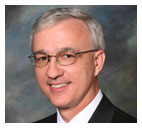|
Download the Media Review | JW in the News | 100 Years of History
Steve Fogle's Feature
Later this year, the U.S. Supreme Court will issue a decision with potentially far ranging implications. The case of Summum v. City of Pleasant Grove stands squarely at the intersection of free speech versus freedom of religion on the map of due process and equal protection. The Summums, a relatively new religious sect, have asked the City of Pleasant Grove to accept a monument containing their seven beliefs to stand on public grounds next to a donated monument containing the Ten Commandments. The city has politely, but firmly declined. The Summums believe this is a violation of their 1st Amendment right of free speech. They also believe that under traditional forum analysis concepts, the city park is a traditional public forum where any government restriction on free speech is presumed to be invalid, or in the alternative, that by accepting and displaying the Ten Commandments monument, the city created a "designated public forum." Pleasant Grove argues that it accepted the Ten Commandments monument as an expression of its pioneer heritage, so the monument became government speech, which may be made without the same restrictions as private speech. In oral arguments late last year, the Justices expressed a number of doubts about whether either argument completely, or adequately, addresses all issues presented by these facts. While the Justices ponder their decision, we have inaugurated a new President with all the pomp and references to deity we've come to expect at such an event. Among the crowd were agnostics, atheists, secularists, and humanists who would argue that such references only serve to point out their second class citizenship due to their lack of religious beliefs. Are such references a violation of the separation of church and state? Can we balance the desired separation with the beliefs of our Founders, which are expressed in so many ways on government seals, buildings, and oaths? How do we include every religion, or lack thereof, without excluding any one religion, or lack thereof? In this day of political correctness, in whom, if anyone, do we (officially) trust? In this day of political correctness, in whom, if anyone, do we (officially) trust? Some argue that John Adams and his posse would tell us to figure it out, just like they had to do back in 1776, based upon the political, geographical, monetary, et cetera landscapes of the day. There is no doubt they were guided by their principles, but they were also realists. They had real problems on their hands and solved them in very real ways. But being a realist doesn't mean you aren't motivated by the highest of ideals, thoughts, and motives. After all, as they say, if you don't believe in something, you stand for nothing. So, it makes sense that we look to the ideals, thoughts, and motives of our Founders for guidance on how we should continue this great American democratic experiment. So why do we insist on the separation of church and state when the collection plates are full of official currency stating, "In God We Trust?" Because in 1776, "We, the People" were, by contemporary standards, a relatively homogeneous group of a few million Protestants fleeing from the persecution of a monarchy which, among other things, made any religion but the Church of England a second class group. The evils of existing under a government with an official state religion were enough to drive our ancestors to risk the two-month crossing of the Atlantic and the unknown dangers of the American wilderness to find a better life. They were pious as a rule and attributed their survival to a benevolent, and decidedly Protestant, God. It shouldn't come as any great surprise, then, that these ideas of a people blessed by a Protestant God should be stamped all over the Founders' ideals for a beneficial society. That shouldn't be taken to mean that the Founders intended this country to be once and forever Protestant or any other religion. It was the threat of government not allowing them to practice their religion that was the greater concern, rather than whether the government was devoid of all references to religious ideas. The U.S. Supreme Court has consistently reviewed the separation of church and state in this historical context and held many apparent endorsements of religious ideals to be merely reflections of the historical underpinnings of the country. The fact that the population has changed a great deal since then makes some of these historical reflections appear to be more of an endorsement of one religion over another than they were intended to be, even by the Founders. In this context, the motto "In God We Trust" is not an endorsement of one religion, but recognition that our Founders historically believed that some form of divine intervention assisted, if not dictated, our very existence as a nation. Why does all this matter? It matters because it leads to all important questions. What do "We, the People" want our society to be? What guiding principles do we want to pass on to our children to honor the legacy of our ancestors? No matter what the answers are, it is important that we take the time to discuss the issues and decide for ourselves, because the Founders left no magic wand to solve these tough questions for all time. As generations before us have done, we must add our own imprint on these questions and change the answers to reflect the current state of our society as well as what we hope it will become. In the end, just like in 1776, it's still up to us to decide in whom we trust and how we choose to express that trust. — Steve Fogle is a partner at Jackson Walker. He can be reached at sfogle@jw.com. |






